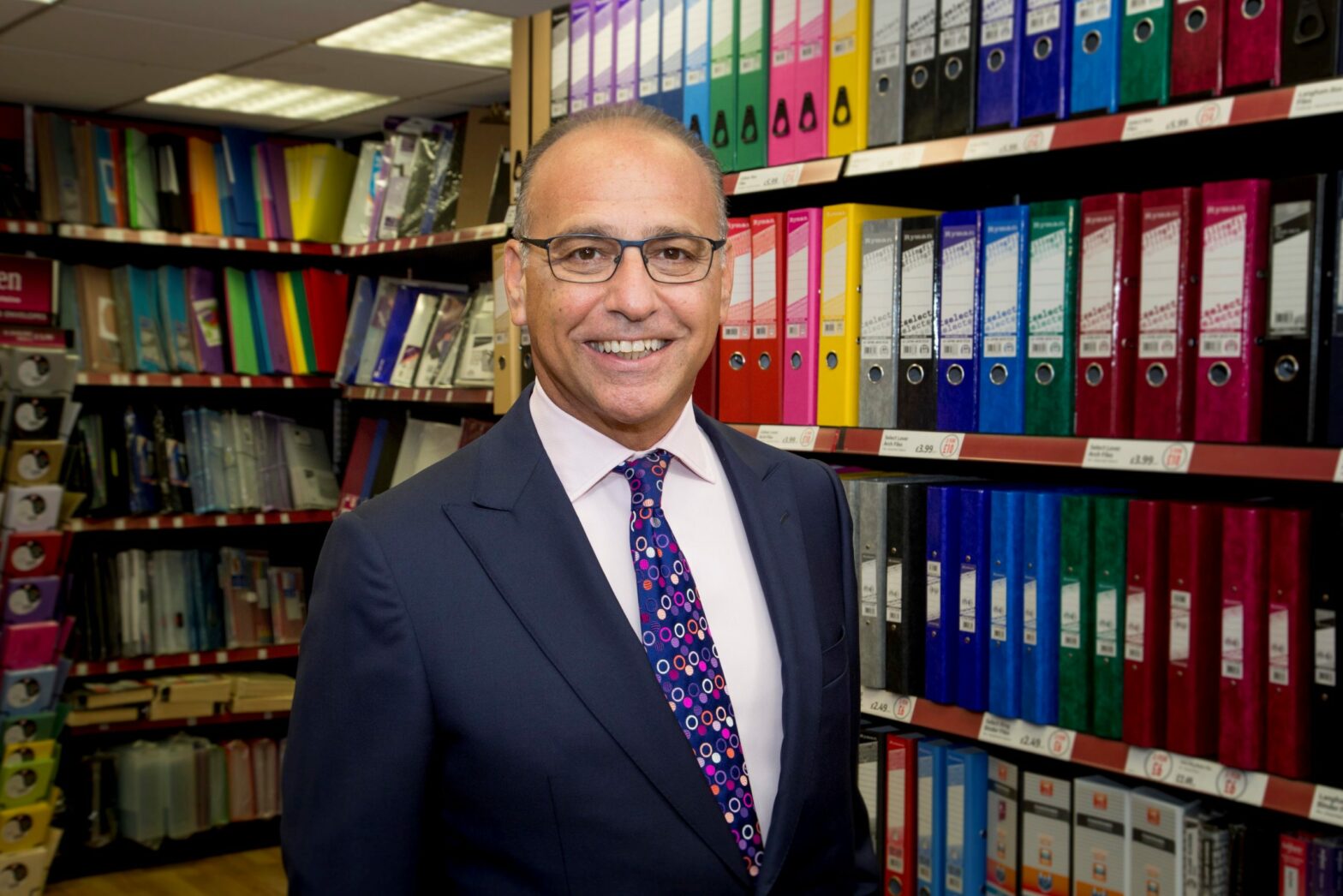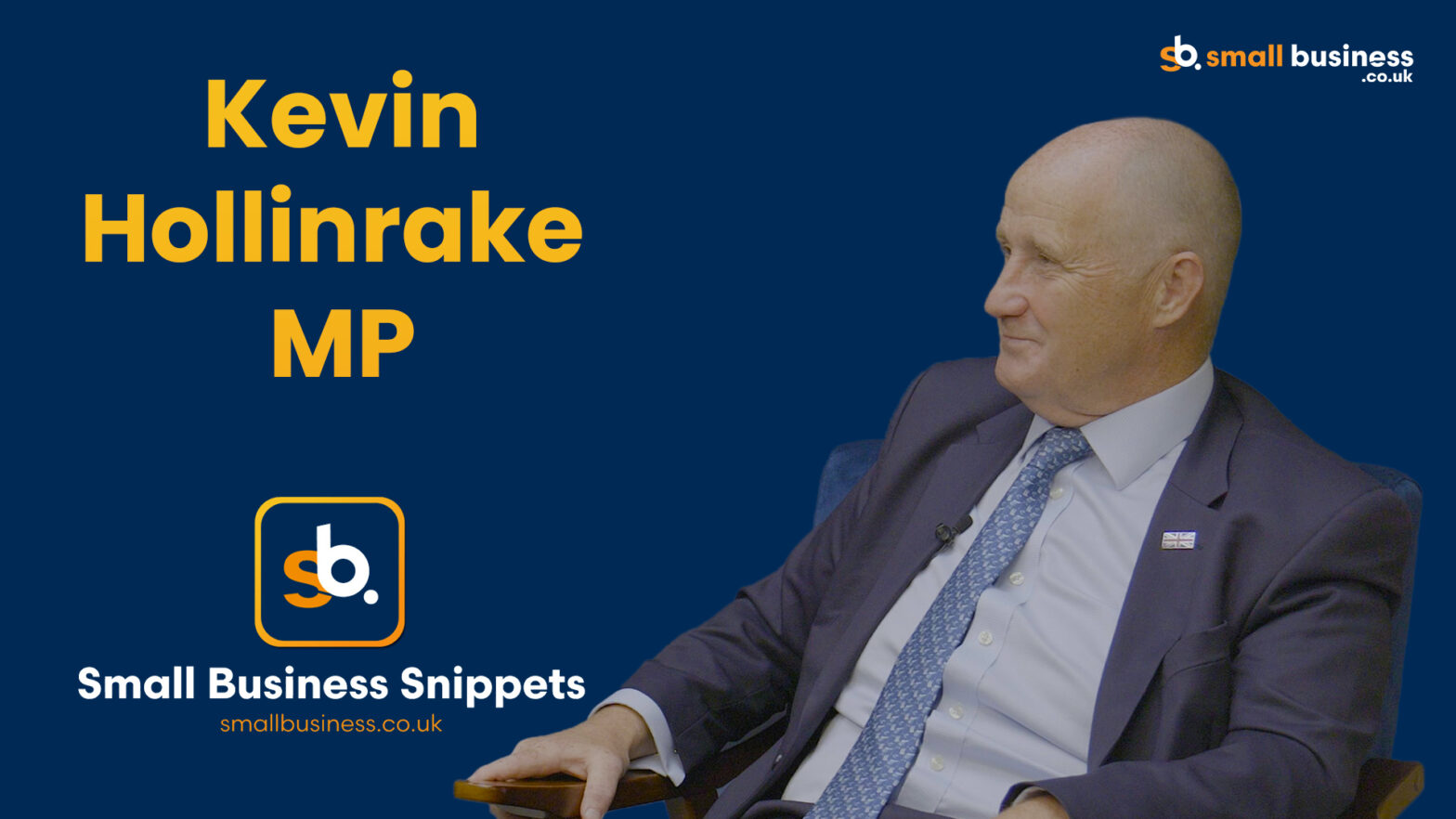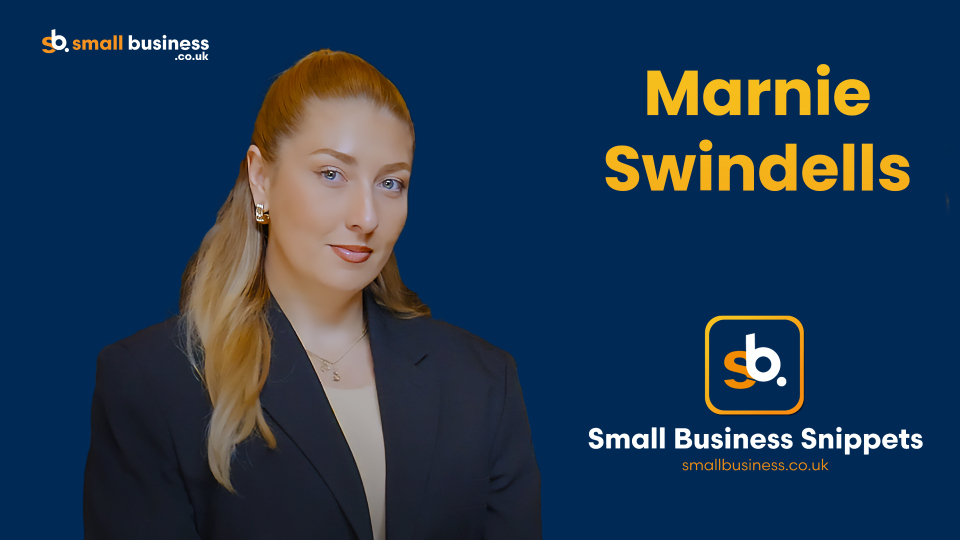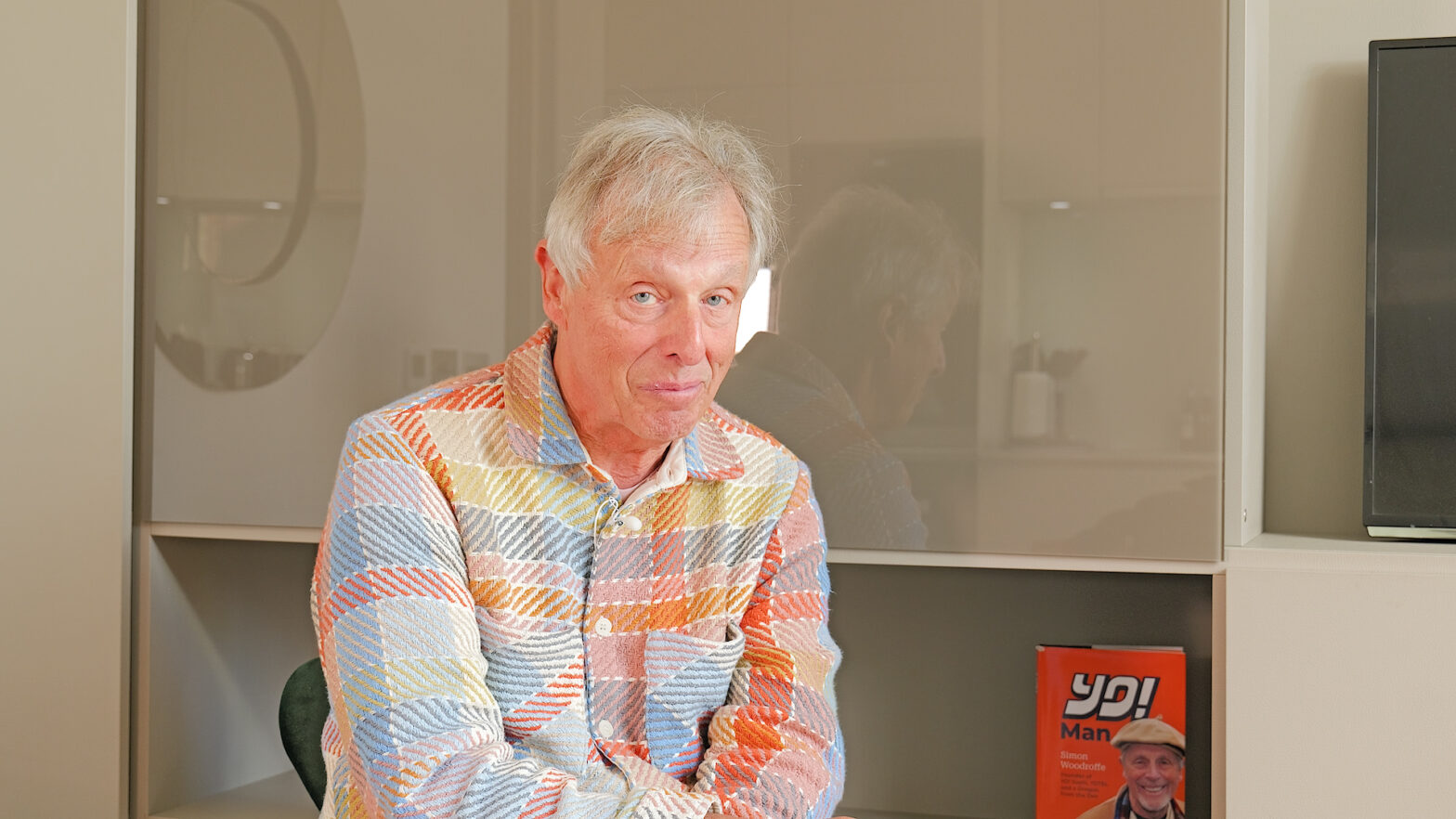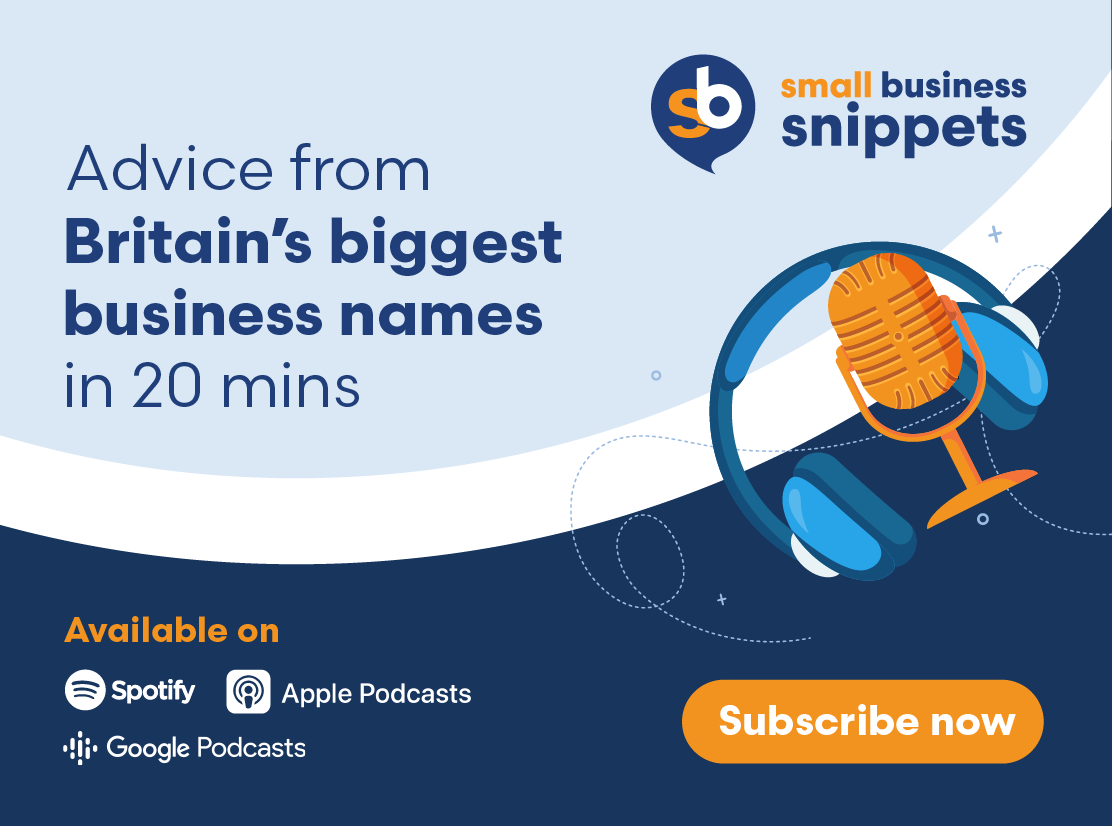Welcome to Small Business Snippets, the podcast from SmallBusiness.co.uk. Today’s guest is Theo Paphitis, a businessman, retail expert, shopkeeper and former Dragon.
We discuss retail during COVID-19 and surviving school and becoming an entrepreneur with dyslexia.
You can also catch our episodes with:
- Author and boardroom expert, John Tusa
- Digital guru and investor, Sherry Coutu
- Entrepreneur and former Dragon, Rachel Elnaugh
- Businesswoman and Dragon, Deborah Meaden
- Entrepreneur and The Apprentice 2005 candidate, Tim Campbell
- Gousto CEO, Timo Boldt
- Entrepreneur and The Apprentice 2018 candidate, Jackie Fast
- Investor and former Dragon, Piers Linney
- Investment fund manager, Nicola Horlick
- Supermodel turned entrepreneur, Caprice
We’ve got podcast episodes from the first series looking at:
- How one business owner’s mental breakdown caused her to see trolls from her past
- How one entrepreneur hired a videographer to track their every move and build their business brand
- How funding a business led one entrepreneur to stress-related alopecia
- One entrepreneur’s first professional public speaking engagement
- Adapting to UK life and learning English before starting a business
- Securing seed funding
- Finding the perfect head of customer care
- Reaching a £1 million annual rate of return
- Boosting client numbers from 30 to 850
- Starting a brand new business from scratch
To find out more about Small Business Snippets, you can download the trailer.
If you want to listen to the podcast elsewhere, it’s available on iTunes, Google Play, SoundCloud and Spotify. It’d also be great if you could leave us a review and subscribe.
Remember to like us on Facebook @SmallBusinessExperts and follow us on Twitter @smallbusinessuk, all lower case.
Would you prefer to read Theo Paphitis’ podcast interview instead?
Hello and welcome to Small Business Snippets, the podcast from SmallBusiness.co.uk. I’m your host, Anna Jordan.
In this episode we have Theo Paphitis, businessman, retail expert, former Dragon and shopkeeper.
Born in Cyprus, Theo came to the UK at age of seven, living in Manchester then London. He left school at the age of 16 with no qualifications after having struggles with dyslexia. He started work as a filing clerk in a Lloyds of London brokerage, moving on to Watches of Switzerland at the age of 18. He had a stint in insurance then returned to retail, taking on names such as Ryman, La Senza and Robert Dyas. In spring 2011, he launched lingerie brand, Boux Avenue. Since then he’s created the Theo Paphitis Retail Group encompassing the aforementioned retail businesses and the London Graphic Centre, which he acquired in 2016.
In 2005, Theo joined Dragon’s Den and in 2012 to focus on his growing retail empire. He came back for a few episodes last year to fill in for Touker Suleyman.
10 years ago, Theo started Small Business Sunday, #SBS, where entrepreneurs describe their businesses via Twitter. Theo retweets his favourites to his audience to boost their exposure.
Today we’re going to be talking about retail in the age of COVID-19 and what it’s like being a business owner with dyslexia.
Anna: Hi Theo.
Theo: Hello! That was quite some introduction.
Anna: Oh, I know. I tried to shorten it, but it’s just come out as ‘Theo’s done quite a lot of stuff!’
Theo: It keeps me busy.
Anna: How are you today?
Theo: I’m good, thank you – in a very soggy Wimbledon.
Anna: Yeah, it seems like that all over the UK. I’m up in Scotland and it’s much the same. But that’s very much, you know…
Theo: I did refrain from butting in there but thank you for doing that for me!
Let’s crack on. I’d like to go back to – I believe you were 15 years old at the time – you opened up a school tuck shop, so retail must’ve been in your blood from quite early on. What was the inspiration behind that?
Theo: Well, the inspiration was actually a need. I didn’t even know what retail was. I’d been in shops, obviously, but at that age – 14, 15 – there was a need at the school. We didn’t have a tuck shop. And on the basis that I didn’t enjoy school very much and I wasn’t a model student in classes. When I suggested to the school that they fund me to do so, they jumped at it because I didn’t have to sit in class for too long, being disruptive. I’m sure that was the main reason.
I thought it was a great opportunity, it was great fun. It was great to learn on the job, overcome problems – of which there were many – everything from litter to security to stock control. All the things that us shopkeepers do day-to-day now.
So, your first retail job was at Watches of Switzerland and you sold a Rolex on your first day. Tell me what that was like and how did it spark your love of retail?
Theo: On my first day, it was all very different for me from what I was doing as an office clerk before. There’s no paperwork involved, just loads and loads of shiny things. Watches and all bits and pieces.
I spent the morning having my induction by the manager. And then I was let loose on the shop floor, a customer came in and there I was, extolling the virtues of the Rolex Oyster, that I’d only just heard of barely an hour ago. All of the information that’d been fed into me came blubbering out with some authority. And there you go – I had a sale. It was amazing.
We know that one of the things from this year is that online sales have exploded – what other changes in consumer habits have you noticed this year?
Theo: When we went into lockdown, I said quite publicly that the longer this goes on for, the more consumer habits will change.
And in fact, within the second week, I could also see that digital was accelerating at unprecedented rates and I estimated at the time that we’d had at least five years of acceleration in the adoption of digital in the time from the end of March 2020 until the end of June 2020. Eventually, it was always in our businesses plan, investment in the digital side, that a lot of our business would go online. So, we’d already invested quite heavily as a business.
But the acceleration in those three months was phenomenal. We weren’t expecting to get that level of increase until about five years’ time.
Actually, coming back to that, your business portfolio is made up, as we heard in the intro, of a lot of retail firms that are traditional to the high street. That must mean you have quite a lot of faith in the future of retail on the high street, despite what naysayers might say and an encouragement to move towards more predominantly digital businesses. What would you say to that?
Theo: I think that like many retailers, we’ve got two legacy, very traditional brands in Ryman and Robert Dyas. Robert Dyas has been trading for over 150 years and Ryman for over 125 years, so they’ve been a big part of the fascia of United Kingdom high streets over those times.
But our services within those and the things that we sell within those businesses have changed quite tremendously in that time. And we always anticipated that some of our stores just wouldn’t make it out of the other side. That was always going to be the case. It was just a matter of when. There’s no point in keeping a store open if you’re the last person standing and nobody’s visiting the high street.
Or, in fact, because of short-termism. And, quite honestly, workshy politicians not reviewing the business rates, which in itself has killed so many high streets. It’s not the rent, it’s the ancillary costs. We’d already planned for that. That doesn’t mean we had plans to shut all of our stores – far from it. We just need to make sure that we focus on the stores where there’s a community. That was always the plan and remains the plan.
You’ve talked about an acceleration in adopting technology, do you think there will be some sort of push to reduce or reform business rates [in the longer term]? It’s been talked about for some time.
Theo: It’s been talked about forever, but I use my words very carefully. I use the word ‘lazy’. I use it a lot when it comes to various people that have held the seat at no.11 that just couldn’t be bothered to put the work in to repurpose business rates.
Business rates is an archaic tax from the 1500s. Ye Olde Internet Shoppe would not exist in the 1500s. The Exchequer needs income, of course it needs income, otherwise how are we going to pay for our services? But you can just keep loading it up on what is a very easy tax to collect and then put people out of business because you reach the law of diminishing returns.
They needed to repurpose taxation to reflect the new modern and digital age. It’s very difficult for people paying rent and rates when other people are trading out of warehouses and contributing very little. It needs to be balanced – it has always needed to be balanced – but even more so now.
Of course, since March, the present Chancellor has absolutely done the right thing in suspending business rates, giving a business rates holiday. That expires in March ’21 and it’ll be interesting to see what he does then. I can’t believe for one minute that he would even contemplate bringing them back. If he does, that would spell the demise of many high streets and many trusted names within those high streets.
What do you think should happen instead?
Theo: I think we’ve got to relook at the way we pay taxes. It’s very simple – it’s not complicated. It requires work, but we’ve got to look at the different ways of collecting taxation, whether it’s a sales tax or any other form of tax you put on, that is fair and allows people to trade on a level playing field.
I think that arguably, for a long time, the worry has been the wealthy individuals who benefit from having those business rates and high costs in place.
Theo: The fact remains that, with landlords, we’ve been able to negotiate as footfall has gone down in various parts of the country. We’ve been able to sit down with landlords a lot. We’re taking a lot less money now. If you want us to remain in your store, then we can only afford to pay X or Y and in the main, they’ve agreed.
We’ve got so many stores where the rates are higher than the rent. That can’t be right. And obviously, you can’t negotiate with the Exchequer.
Absolutely. Do you think there are certain types of businesses that would move into empty high street spaces in the future, especially when things start to settle post COVID-19?
Theo: What we’ve seen is the conversion of many high streets into old age people’s homes where they’ve just built loads and loads of retirement homes, sheltered accommodation because it’s in close proximity – right on top of the high street. If that’s what we’re planning – to turn high streets into retirement villages – then that’s a different story altogether because that’s what you’re going to get.
But high streets have really been the backbone of the community. So, you start destroying it and everybody stays in their homes and you’ve got millions and millions and millions of vans driving around and polluting the atmosphere, delivering a £4 or a £5 or a £3 product. Does that really make sense?
What do you think about a digital tax?
Theo: The Exchequer needs to collect income and that’s a great way of doing it.
I’ll move on a little bit here. In the intro we mentioned Small Business Sunday which, on the day of recording (October 12th), launched 10 years ago yesterday. In your view, what is the greatest success story to come out of SBS?
Theo: It’s got 3000 businesses at different sizes, different levels of activity. The biggest success story is the fact that it exists, and it allows small businesses and medium-sized businesses, all of a sudden, to get a leg up, get PR, get a social media boost, support for other SBS winners in the network.
It boosts sales. It offers opportunities for them to collaborate. It gets them together at our annual event to hear great speakers, talk to them and inspire them about what the future holds.
Don’t forget that it’s really tough to be a small business – 50 per cent of businesses fail within the first two years. And that’s probably normal because they haven’t got the skillset, the information, the support that they need. Some fail and then go on to run really successful businesses because they’ve learned from their failures. So, the whole gambit of SBS is to try and assist to lower that failure rate and give support and all of the things that small businesses need.
It’s tough – if you’ve got two or three kids and you’re running a business from your kitchen table and you’ve got to balance a household. Where do you go for help when things aren’t running your way? Who can you talk to that’s having or has had the same experience as you? I can guarantee that someone form SBS has and someone will be able to talk to you about it. And somebody when you’re having a tough time is going to be having a really good time and there’s nothing better than to talk to somebody to bring you out of those doldrums and give you that burst of enthusiasm that you desperately need to get you going.
Anna: Sometimes that’s all you need – I’ve seen some of the comments back and forth on the thread and it’s quite the community.
As mentioned in the intro as well, you struggled at school because you have dyslexia. From the research I’ve done, it seems like people with dyslexia felt discouraged at school (‘you have this, so you can’t do that’) but went on to be successful entrepreneurs because they worked hard at their other qualities, like social skills. How does that align with your experience of school and going into business?
Theo: Oh, that describes me. When I turned 16, they showed me the door. Not because I was particularly disruptive, but because I was a lost cause. I wasn’t going to get any examinations.
Anna: They dismissed you before you even took them?
Theo: No, I did sit a few, but I ended up with great big ‘U’s. In fairness, I did get one certificate, and it was a Scottish certificate in colouring in maps. It was geography. And the reason I say it was a Scottish certificate is because we had the most amazing Scottish lady teacher who worked incredibly but had got all of our attention and made it very interesting. I always call it my Scottish certificate in colouring in maps.
It was clear school wasn’t for me. Even to get through to 16, I had loads and loads of workarounds to try and get my work and homework done. I couldn’t do it in a traditional way. I was always problem-solving to try and achieve what other kids were achieving in minutes. It took me hours.
I always found workarounds to deal with the issues so that when I actually went to work, dealing with issues and problems was a piece of cake – I’d been doing it all of my life. Some kids go to work, who had an academic upbringing at school, sit there and there’s a problem. Now they’ve got a problem. So that was one of the things that I benefited from.
Anna: What do you mean when you say workarounds? Could you elaborate a bit?
Theo: For instance, my first day at work, I had to go with a picture in my pocket. If I’m doing numbers – which I’m not bad at, to be honest with you – I couldn’t remember my times tables. It was a nightmare. But I could find workarounds. For instance, if I needed to do 12×12, it’d be 10×12 which is 120, and two more equals 24. That’d be 144. Or I’d break it down into fives or threes or ones to get there or find percentages.
You always had to find different ways, it takes longer, but you get there.
Anna: Exactly – and that’s what’s important.
Theo: And then the biggest thing that changed my life was computers. I no longer had to worry about spelling or rubbish handwriting. All of these things I could get over, so I really embraced technology very early.
Anna: That’s an advantage in a way, isn’t it?
Theo: It is an advantage – and always has been – hence why I embraced eCommerce and digital and I embraced computers and had one of the first computers. I learned to program because there wasn’t any programs to give me what I wanted. I thought, “It can’t be that difficult, can it?”
It gives you a push. It’s interesting to see that other entrepreneurs like Lord Sugar, Richard Branson and Jamie Oliver have dyslexia as well.
Theo: Well, of course, a lot of dyslexic people are pushed to be entrepreneurs because they can’t get a job anywhere else. The key thing is that that it’s difficult to get a job when you can’t spell or you can’t read very fast.
I can read, believe you me, I can read. Give me a contract and I will read it front to back and I will understand it and I will be as good as anybody else, but it will take me three times as long as anybody else to do. It’s just a speed thing.
Exactly. Fortunately, we are in a better place now, especially in schools with picking up dyslexia earlier on, allowing longer exams and that sort of thing. But if you’ve got someone out there who’s still at school, has dyslexia and wants to be an entrepreneur, what kind of things would you say to them?
Theo: Well, the good news is that it will be one of the least resistant paths open to them. You’ll find it hard to compete in the jobs sector when people have got all of these qualifications and you haven’t.
But all I can say to them is make sure that when you become an entrepreneur, become an entrepreneur doing something that you love and are passionate about. You can become an entrepreneur doing lots of things but find something that you’re passionate about because on those dark, wet winter days, when things are not running according to plan and you’re down to your last few quid, you need that passion, that enthusiasm, that drive, to get you out of it.
And if you’re doing something you’re not really passionate about, then you might, just might, throw in the towel. But it’s about doing something you’re passionate about. That’s the best chance of success.
Anna: Well, that seems like a great place to wrap up. Thank you for coming on the podcast, Theo.
Theo: Absolute pleasure.
Find out more about Theo at theopaphitis.com. You can also visit smallbusiness.co.uk for more articles on retail and supporting employees with dyslexia. Remember to like us on Facebook @SmallBusinessExperts and follow us on Twitter @smallbusinessuk, all lower case. Until next time, thank you for listening.
